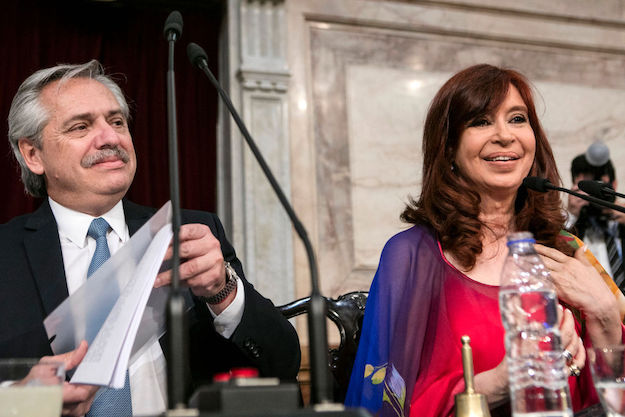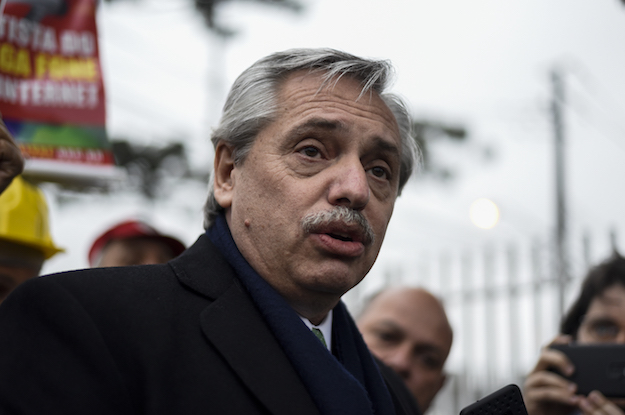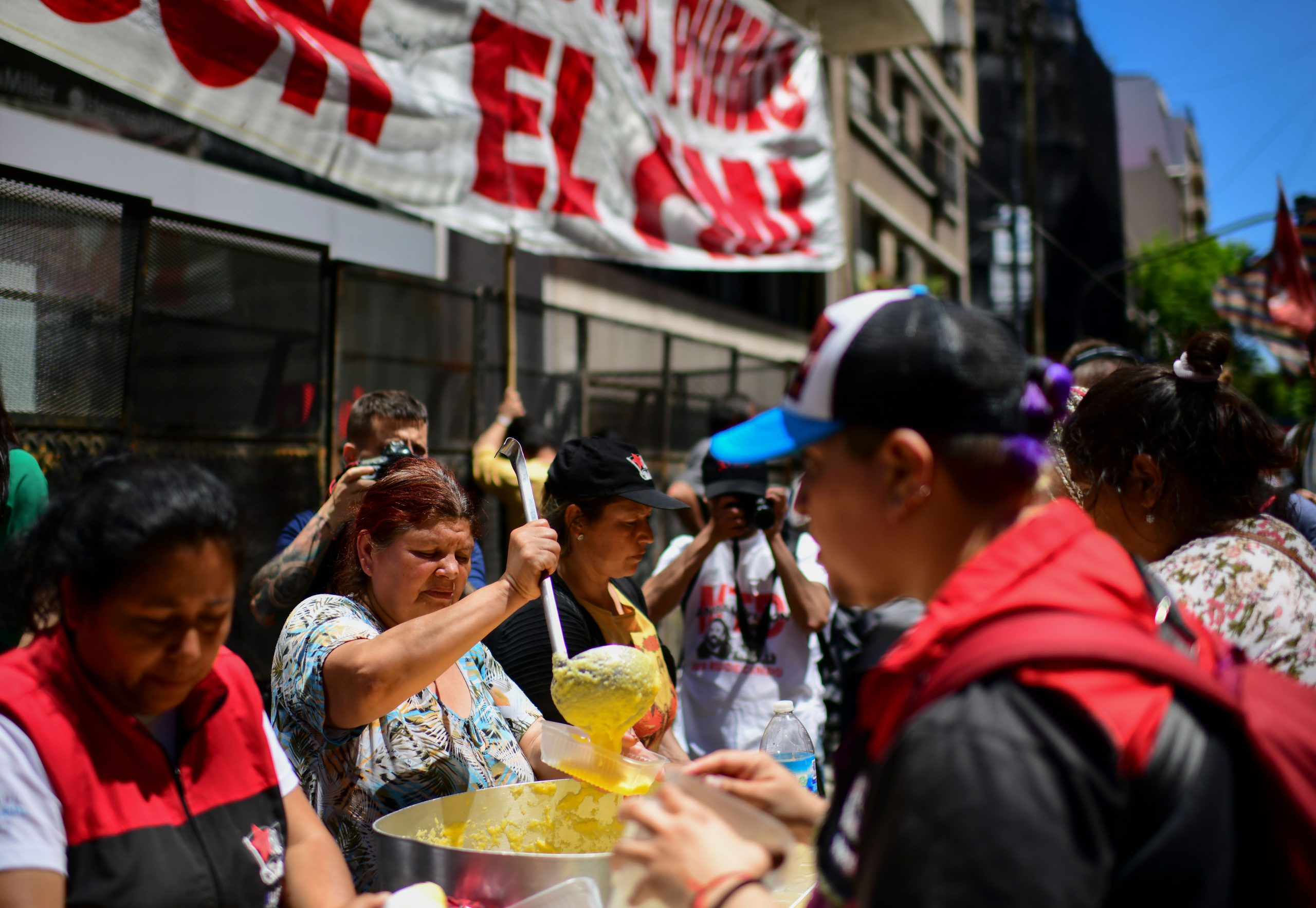Until recent weeks, Argentina’s President Alberto Fernández and Economy Minister Martín Guzmán had been reassuring foreign investors that they were keen to avoid a repeat of the widespread default, financial isolation and humiliating legal defeats (in New York federal courts) that Argentina had experienced between 2002 and 2015.
Guzmán was a mere college student in the early 2000s, but Fernández was deep inside the Casa Rosada, serving as cabinet chief from 2003 until 2008, mostly under President Néstor Kirchner – but also during President Cristina Fernández de Kirchner’s first year. It is safe to assume that his memories of that period are still fresh.
But ever since the COVID-19 pandemic arrived in Argentina in late March, the government’s tone toward investors has begun to change and harden. By now it seems clear that Fernández and Guzmán, likely under pressure from the Peronist faction led by Fernández de Kirchner, now the vice president, are at high risk of repeating that futile history under cover of the pandemic.
Back in 2004, the Néstor Kirchner administration came up with a punishing debt-restructuring plan that would impose losses on investors of about 70%. They presented it to foreign-law, foreign-currency bondholders on a take-it-or-leave it basis. Breaking with established international best practice, the authorities in Buenos Aires never engaged in timely – or even last-minute – good-faith negotiations with their creditors, whether private-sector or official bilateral and multilateral agencies.
Then-Economy Minister Roberto Lavagna went so far as to state that the government would regard a participation in the restructuring plan above 50% of debt holders as having effectively cured the country’s default. And this was the official attitude even though the bonds had been issued subject to New York and other foreign law and jurisdictions, most with indentures specifying that 100% of creditors would have to agree to any changes in key payment terms.
It was Argentina’s bald violation of creditors’ contractual rights that led tens of thousands of investors to withhold their approval of the 2005 debt-restructuring deal, and to run to their respective local courthouses for redress. That reaction to a coercive, unilateral restructuring engendered the investor holdout movement that would come to haunt and isolate Argentina until 2016, spearheaded by the infamous “vulture funds.”
Fast-forward to April and May 2020, and the Fernández administration has come up with a harsh debt-restructuring plan featuring a major haircut to investors, this time on the order of 60%. This plan is also being presented to foreign-law, foreign-currency bondholders on a take-it-or-leave-it basis. Investors holding $66 billion of bonds are being asked to write off some principal and most interest payments throughout the decades-long life of new bonds to be issued in exchange for existing ones.
Leading investor groups have spoken out against the government’s proposal, and three of them together hold enough bonds to block its acceptance. While Argentine bonds issued in recent years no longer necessitate unanimous investor consent, they do require affirmative votes from super-majorities ranging between two-thirds to 85% of bondholders to modify their payment terms. And yet, according to Guzmán, there is no room or time for negotiation.
To make the point crystal clear, the Argentine authorities have now ratcheted up the pressure on investors by skipping a $503 million payment due on April 22. This sets the clock running on what, after a 30-day grace period, could easily turn into Argentina’s ninth sovereign default on foreign-law, foreign-currency debt.
The difference is that today’s Argentina cannot afford another long period of international financial isolation. The Kirchners could do so because world commodity prices soared from 2002 until 2008, and after a temporary collapse during the global financial crisis, climbed again until 2012.
This was a godsend: The Kirchners were quick to impose hefty taxes on commodity exports, thereby appropriating from farmers, miners and oilmen the billions of dollars needed to fund populist policies, notably new welfare programs for the poor and subsidies on fuel and public utilities for the middle class.
However, once commodity prices started to come down and export taxes had to be reduced, lest production for export collapse, populism began to run short of funding. This happened in Argentina as well as in other countries burdened with unaffordable policies, as in Ecuador. When given a chance, voters opted for change and this is how the likes of Mauricio Macri (Argentina) and Lenín Moreno (Ecuador) gained office – only to encounter empty fiscal cupboards and the urgent need to find new financing, having to rein in the populist largesse of their predecessors.
In sharp contrast to the early 2000s, Argentina is now in a very vulnerable position. As is the case everywhere around the globe, dealing with the COVID-19 pandemic, especially through business shutdowns and isolation policies, is precipitating a major shortfall in tax revenues just when government spending must be ramped up on various emergency support programs. A synchronized world recession is meanwhile pushing commodity prices sharply lower – most dramatically in the case of oil, but already 10% lower in dollar terms from a year ago for non-oil commodities on average.
Unable to finance itself domestically or abroad since the middle of last year due to a lack of investor confidence, the government of Argentina has been leaning on the central bank more and more to finance an expanding budgetary deficit. The resulting flood of newly minted pesos is putting downward pressure on the currency and upward pressure on inflation – a toxic combination.
But there is a way out. Argentina could break the impasse with its private creditors by deciding to seek a refinancing of its outsize debt-service payments to the IMF. This would be achieved by requesting support under an Extended Fund Facility to replace the failed Standby Arrangement during which $44 billion were disbursed between mid-2018 and mid-2019.
As things stand, the IMF loans are due to be paid back in full between now and 2024. These scheduled payments to the Fund amount to more than 40% of total foreign-currency payments the government of Argentina is supposed to make between 2020 and 2024. By Argentina not having a debt-relief deal already in place with the IMF, as is best practice, bondholders are naturally concerned that the payments that would otherwise be made to them will be redirected to pay down the IMF.
Asking for help from the IMF, to be sure, is a third-rail political decision which Fernández cannot take without support from the vice president and her more combative Peronist wing. But it is the only pragmatic solution that at this point could forestall Argentina’s slide into a generalized default. In fact, such a partnership with the Fund would pave the way for a gradual return of investor confidence and the reopening of Argentina’s domestic bond market for renewed financing on a voluntary basis, thus diminishing the likelihood of an inflationary explosion ahead.
—
Porzecanski is on the faculty of American University’s School of International Service, in Washington DC. Prior to moving to academia in 2005, he had a long and distinguished career as an international economist on Wall Street, specializing in emerging markets.







